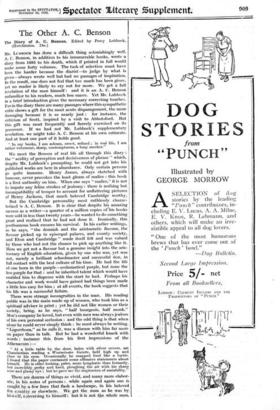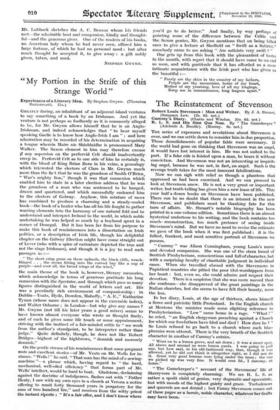The Other A. C. Benson
The Diary of A. C. Benson. Edited by Percy Lubbock. (Hutchinson. 24s.) Mu. LUBBOCK has done a difficult thing astonishingly well. A. C. Benson, in addition to his innumerable books, wrote a diary from 1895 to his death, which if printed in full would make some forty volumes. The task of selection must have been the harder because the diarist—to judge by what is given—always wrote well but had no passages of inspiration. In the result, one does not feel that too much has been given, yet no reader is likely to cry out for more. We get a full revelation of the man himself : and it is an A. C. Benson unfamiliar to his readers, much less suave. Yet Mr. Lubbock in a brief introduction gives the necessary correcting touches. For in the diary there are many passages where this sympathetic critic shows a gift for the most acute disparagement, the more damaging because it is so nearly just : for instance, the criticism of Scott, inspired by a visit to Abbotsford. But this gift was most frequently and fiercely exercised on its possessor. If we had not Mr. Lubbock's supplementary revelation, we might take A. C. Benson at his own estimate. And at least one part of it holds good.
" In my books, I am solemn, sweet, refined ; in real life, I am rather vehement, sharp, contemptuous, a busy mocker."
We meet the Benson of real life all through this diary : the " acidity of perception and decisiveness of phrase " which, despite Mr. Lubbock's prompting, he could not get into his published works are here in abundance. Only certain persons go quite immune. Henry James, always sketched with humour, never provokes the least gleam of malice : this book is a first authority on him. When one says " malice," it is not to impute any feline strokes of jealousy : there is nothing but incompatibility of temper to account for unflattering pictures of Henry Jackson, that much beloved Cambridge worthy.
But the Cambridge personality most ruthlessly charac- terized is A. C. Benson. It is clear that despite his amazing success as a writer—a quarter of a million copies of his books were sold in less than twenty years—he wanted to do something great and realized that he had not done it. Ironically, this posthumous book ensures his survival. In his earlier writings, as he says, " the donnish and the aristocratic flavour, the flavour picked up in episcopal palaces, and county society, and Eton and Cambridge " made itself felt and was valued by those who had not the chance to pick up anything like it. Here we get not a flavour but a genuine insight into the aris- tocracy of English education, given by one who was, yet was not, merely a brilliant schoolmaster and successful don, in full contact with the best culture of his time. He had the life of one born in the purple—ecclesiastical purple, but none the less purple for that : and he inherited talent which would have enabled him to dispense with the start he had. Perhaps his character and work would have gained had things been made a little less easy for him ; at all events, the book suggests that his life was a successful failure.
There were strange incongruities in the man. His reading public was in the main made up of women, who took him as a spiritual adviser in print ; yet he did not like women or their. society; being, as he says, "half bourgeois, half monk." Men's company he loved, but even with men was always jealous of his own personal seclusion : and the odd thing is that when alone he could never simply think : he must always be writing. "Logorrhoea," as he calls it, was a disease with him far more on paper than in talk. But he had a wonderful knack with words instance this from his first impressions of the Athenaeum':- " At a little table by the door, laden with silver covers, sat Chamberlain reading a Westminster Gazette, held high up and close to his eyes. Occasionally he snapped. food like a turtle. I found that the paper contained some offensive statements about himself. He is older looking, paler, more lymphatic than formerly, but incredibly_ perky and hard, ploughing the air with his sharp nose and glassy eye ; butlui gave ms the impression of amiability."
There are dozens of things as vivid, and many more elabor- ate, in his notes of persons : while again and again one is caught by a few lines tliat flash a landscape, in his beloved fen country or elsewhere. .. We get the man as he was by conversing to himself : but it is not the whole man. Mr. Lubbock sketches the A. C. Benson whom his friends met—the admirable host and companion, kindly and thought- ful—and the generous giver. One of the readers of his books, an American lady whom he had never seen, offered him a large fortune, of which he had no personal need : but after much thought he accepted it, to give away : a gift nobly given, taken, and used.
STEPHEN GWYNN.































































 Previous page
Previous page